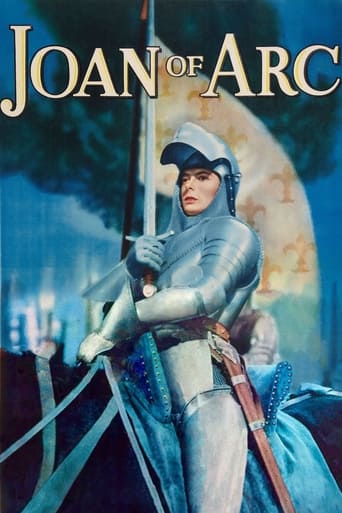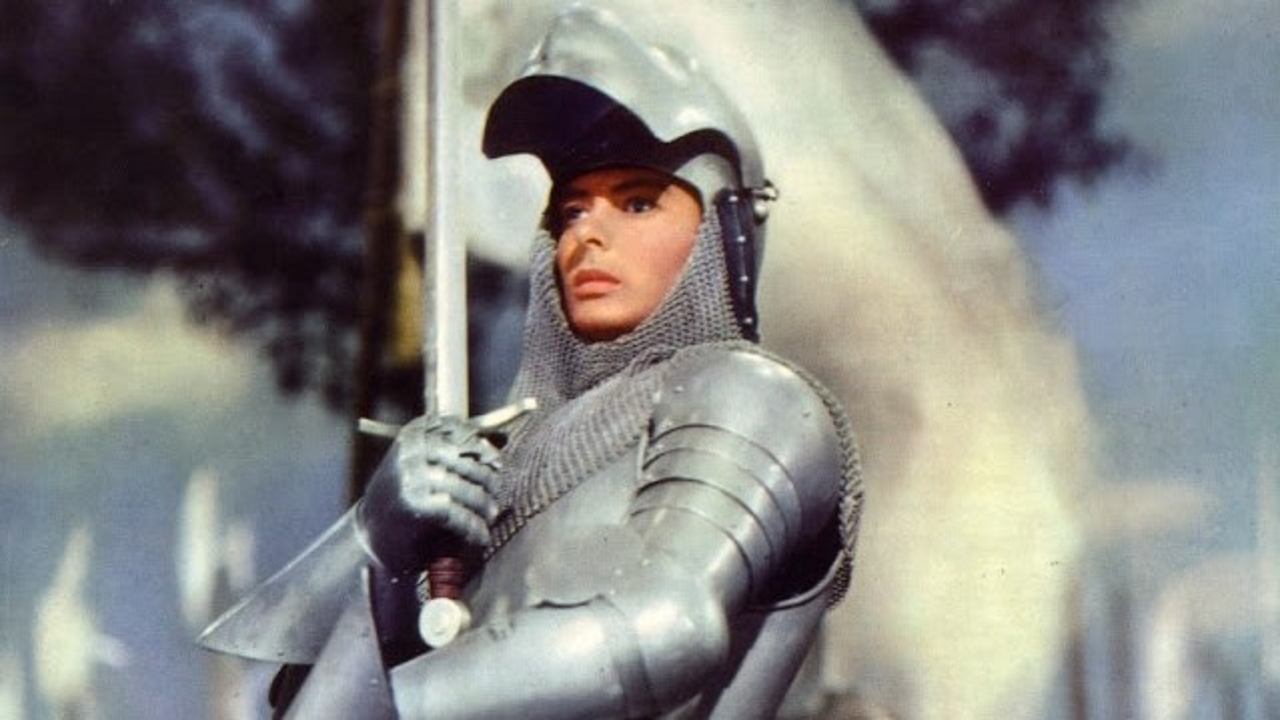Steffi_P
In our era there are women warriors in film and TV, from Xena to Beatrix Kiddo, but back in Hollywood's classic era they were an extreme rarity. Joan of Arc was an exception that was acceptable partly because she came from history not fiction and, more crucially, she was a saint and a miracle worker. The tale was told in the only way it could be then, as one of the religious epics that would become a major presence in the cinema of the following decade.Appearing a few years before the epic genre really took off, and while studios were still recovering from the lowered budgets of WW2, Joan of Arc is not quite as grandiose as the biblical movies that would come later on. Based on a play (Maxwell Anderson's Joan of Lorraine), upon its release it was accused of being too talky and lacking in action. But this is made up for in a number of ways, not least of which is its lavish period detail. It is epic in scope and scale, but only so far as the history requires. There is no spectacle for spectacle's sake. The movie is exactly as big and spectacular as it needs to be.The movie is also buoyed by a leading performance from Ingrid Bergman. Bergman brings a necessary presence to the role, not in her delivery of lines but in the power of her emoting, which transcends any stolidness in the screenplay. An especially notable moment is her look of genuine disappointment when she realises that the dauphin has been replaced by one of his lackeys. The other standout performance is that of José Ferrer as the real dauphin. Fresh from the stage, Ferrer is theatrical, Shakespearean even, but that is just the sort of exuberant touch the movie needs to stop it becoming staid.This was the final project of ace director Victor Fleming, who had earlier helmed (most of) Gone with the Wind and The Wizard of Oz. Joan of Arc sees him taking a more relaxed pace (his trademark was speed and punchiness), but with no less of an eye for intelligent staging and shot composition. There's an excellent scene where a young Joan wanders distractedly away from the chattering of her family to sit alone by the fire, framed in profile with the flames forming a corona about her head. This isn't just some obscure bit of symbolism or foreshadowing, it's a way of showing her in clear isolation while still keeping her image dynamic and vibrant.The presentation and performance of this edition of the Joan of Arc story compensates for its dramatic, dialogue-based format. And, while it remains very much a movie based on Joan's sainthood and Christian devotion, Bergman makes her touchingly human, and this allows the character to reach us from the past.
sendraguy
After what seems like gargantuan efforts to obtain the DVD and the necessary equipment I have finally managed to see the uncut version of Joan of Arc.I am thrilled with this new DVD and will add nothing further to the positive comments that have already been made. However I should like to pay particular tribute to the wonderful music of Hugo Friedhofer. Of course, for years I loved his score for 'The best years of your life' but in terms of writing for an earlier period I never regarded this composer is quite the same league as, say, William Walton, whose Shakespeare/ Olivier scores were so memorable. But I have been forced to revise my opinion.It was Max Reger who commented to the English composer Vaughan Williams: 'you have a veritable obsession with the flattened seventh' Well so, it seems does Mr Friedhofer! I suppose one either likes or loathes pastiche and modal writing. I adore it, and think that in Joan of Arc we get the best of both worlds. The music has a direct and powerful emotional appeal. It could scarcely fail to have. Yet given the fact that Friedhofer uses C20th conventions, harmonies, instruments and musicians, his 'nods' in the direction of C15th French church music are tastefully enough done for us to feel that such scenes as the coronation are, if not exactly in any sense 'authentic' then still marvellously effective.I should dearly love to know whether anyone has arranged the score into a suite of pieces and recorded it. That would be a rare treat. Perhaps some other readers can advise?
Andrew Schoneberg
A very poor film translation of a stage play--rather than being tailored to the movie medium, this is very stagy, overly talky. The dialogue is arty and artificial. Everyone is obviously acting, giving a performance, though Bergman is radiant and her performance is passionate and sincere.All of the exteriors (outdoor shots) which feature close ups of the lead actors are obviously shot on a sound stage. Some beautiful outdoor footage is used occasionally for establishing shots or transitions between scenes, but Bergman never leaves the soundstage. On the positive side, the film is beautifully photographed, many individual shots are works of art, masterfully lit and composed. However, the camera moves only when necessary to follow the actors, the shots are static, adding to the staginess of the production. Which reminds me of CB DeMille; you could get a good idea of this film by saying it's like a DeMille film, only with more high art pretensions and less spectacle (no cast of thousands here).The most outstanding aspect of 'Joan of Arc' is the music, it's prominently featured, good and loud, and it deserves to be--it's gorgeous. The DVD has no extras at all, though the image and sound are excellent--a very good restoration job. A commentary track would have been very welcome; my guess is this was a challenging production, possibly with a long production period (three cinematographers are listed). It was a commercial failure, at least in part because of public condemnation of Bergman's personal life. I believe director Victor Flemming died soon after production. Lots of meat here for an interesting commentary or two.
Neil Doyle
I haven't seen the DVD version. This commentary is based on the horrible VHS print I viewed and promptly tossed out. I now know that 45 minutes of the original film was missing and replaced by commentary that in no way made the story coherent.But the shortened version contained dialog that sounded so theatrical and was delivered in non-credible fashion by a cast of professionals under Victor Fleming's uninspired direction.This is clearly not one of Bergman's best performances. She is radiant in many of the close-ups although a little too old to be believable as the young Joan. The film betrays its stage origins and is much too talky for extended sequences. The only time the film embraces some action is during a poorly staged battle sequence.Summing up: I suppose it's unfair to judge the film based on the print I saw--but even allowing for the bad editing, it is apparent that this was not a successful transition to the screen of what apparently was a marvelous stage role for Ingrid. Jose Ferrer gives the most interesting performance as the Dauphin but others are simply part of the scenery.Costumes are beautiful and some of the sets look impressive but overall it has no cinema magic and leaves the viewer with a flat viewing experience. I'll have to watch the DVD version if I'm to change my opinion since the cinematography surely must look better on DVD.P.S. - Have just read Michael Sragow's new book on Victor Fleming and even the great director himself said, "It's a disaster, that picture."P.P.S. - TCM has just shown the fully restored version of JOAN OF ARC and it's a much better film than it appears to be in the edited print which I first saw on VHS. Furthermore, the sets are magnificent, the color restoration is excellent, and all technical issues are much better represented. But the script is too talky and leaves the film stage bound at points. Bergman looks incredibly radiant in all of her close-ups but it seems like a surface performance and one that is not that deeply felt.



 AD
AD




